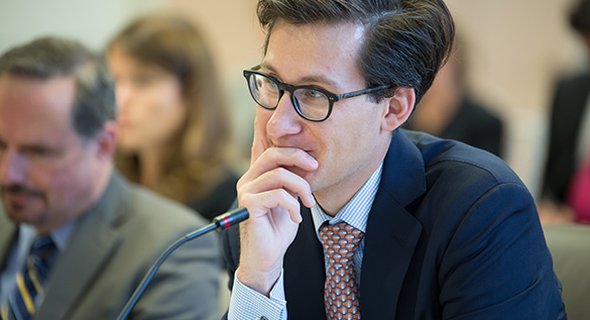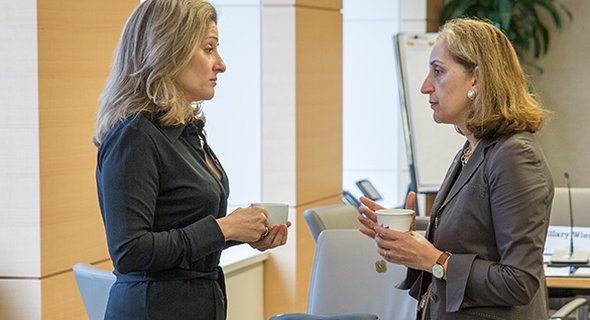Definitions, Drivers and Philanthropy-Sector Approaches
On October 2, 2015, Carnegie Corporation of New York convened a meeting of experts, policymakers and funders during the 70th Session of the UN General Assembly to discuss transnational militancy and the global rise of influential non-state actors. Thirty-five participants representing eighteen organizations including foundations, the United Nations, and the U.S. Department of State participated in the conversation. The meeting took place at a time of crisis for millions of refugees in the Euro-Mediterranean, as the impact of the war in Syria reached Europe. At the same time the UN launched a number of initiatives including the Sustainable Development Goals and both a Youth Summit and a Leaders Summit on Countering ISIL and Violent Extremism. The UN discussions highlighted many factors at play driving militant movements, reinforcing the urgent need to end prolonged, unsolved conflicts, poor governance, political and social exclusion, and violations of human rights.
The meeting consisted of two sessions, the first moderated by Transnational Movements and the Arab Region Program Director Hillary Wiesner and the second moderated by Meredith Stricker, Peace and Security Funders Group Program Director. Panelists included Professor Juan Cole of the University of Michigan, U.S. Undersecretary for Public Diplomacy and Public Affairs Richard Stengel, U.S. Department of State Director of the Office of Multilateral Affairs Raffi Gregorian, Geneive Abdo of the Stimson Center, Ali Soufan of the Soufan Group, and Professor Marwa Daoudy of Georgetown University. By way of introduction, Hillary Wiesner highlighted the systemic nature of violence fed by failures of governance and failures of policy. She emphasized the value of clarifying the political economy and financial drivers of militant movements, and she asked whether phenomena grouped as extremism could instead be enumerated as specific violations of human rights and law. Corporation President Vartan Gregorian spoke of the religious and cultural diversity that has always existed both within the Arab region and Islam, and recognized the abundance of formally trained religious scholars who have spoken out against ISIS and related movements.
Discussions revealed a diversity of views surrounding approaches to militancy and its impact. Emphasis fell on the need for new paradigms for analyzing and de-escalating conflict, as well as supporting policies to advance citizenship and good governance in the Arab world and beyond. A number of participants pointed to new approaches to transnational movements and non-state actors, mobilizing social science analysis of both conflicts and policies, as well as legal and rights-based methods. “Clarifying legal components would help everyone,” a participant said, “as would broadening government thinking.”
The frames termed as “extremism” and “countering violence extremism” have gained prominence amongst U.S. and other policy circles. However, meeting participants expressed frustration with the lack of clarity such a term offers. The term “extremism” is perplexingly used to describe both individual paths to radicalization and highly functional militant movements that arise out of contexts of war and armed conflict. One participant asked, “How do we now define violent extremism? Young Muslims from Belgium fighting in Syria? ISIS in Mosul? Pogroms? Neofascism in Greece? All are part of CVE policy.” The term and its approaches tend to problematize the individual’s path to radicalization as a psychological pathology rather than examining large-scale geopolitical and financial drivers of militant movements, as well as foreign intervention, failed government, and war economies. Instead, Middle East experts at the meeting stressed the need to clarify the funding of militant groups and limit their material power, stating that today’s conflicts become self-sustaining through economic transactions and financial networks. Another participant interjected, “the framing of violent extremism perhaps does more to obscure than elucidate,” suggesting that a global approach is not productive, adding, “Is it time to get rid of Countering Violent Extremism (CVE)?”
According to a recent study by Mercy Corps, militancy and mobilization to violence correlates less with poverty or unemployment than it correlates with exposure to violence or injustice. Carol Bellamy, Chair of the Global Community Engagement and Resilience Fund, said, “Development people have known about poverty not being at the root of violence for a long time. However, most of the funding is on the counterterrorism side,” she added, emphasizing the need for significant readjustments in local engagement. “You can only get so much done with hot air,” she said. “You need money, too.”
Discussions on these topics continued in a meeting with European donors, hosted by Cordaid in partnership with the Peace and Security Funders Group, in The Hague, Netherlands, on October 29. Efforts are underway to connect human rights and governance standards with transnational social movements and non-state actors. States are experiencing more limited control of territories and citizens than in the recent past. There are significant shortfalls in the capacity of current legal mechanisms to extend to non-state movements engaged in governance and social organization. If human rights standards are to survive in the 21st century, new mechanisms of application might be less reliant on traditional nation-states. Thus, instead of attributing the limited success of groups like ISIS to ideology, it is worthwhile to explore structural and economic drivers of political violence and to address criminality through a legal and rights-based approach.
- Press Releases
















